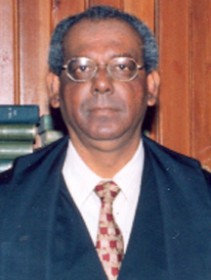Speaker of the National Assembly Ralph Ramkarran believes the libel laws will be changed by the courts when a suitable case presents itself to offer greater freedom of the press and to reflect the reforms that have swept other countries within recent years.

Ramkarran, who is considered a presidential hopeful in the PPP, offered his opinion in the Weekend Mirror, in an article titled, ‘Criticising public officials.’ He referred to debate over the stringency of the libel laws in Guyana, saying victims of libel actions here have complained that the inflexibility of the laws reduce their capacity to expose the wrongdoing of public figures who have duties to citizens.
He said the US libel laws had a progressive genesis beginning with the inability of the press to report fully on the civil rights struggle in the South in the 1960s which changed with the breakthrough in the 1964 case of the New York Times v Sullivan. He wrote that the US Supreme Court unfettered the press to expose discrimination and oppression in the US South with its landmark ruling. He noted that English courts retained the common law formula after the US court ruling, but pointed out that they were slowly forced to recognise the right of the media to more rigorously examine the actions of public officials although there were no substantive developments in the law after the media became increasingly invasive and intensified its scrutiny of public officials. “Our situation was always contrasted with that of the United States where it appeared that politicians could be lawfully criticised with a defamatory vehemence which was impossible in Guyana,” Ramkarran wrote. He stated that the source of the problem has been the application of the doctrine of malice which is an essential element in defamation. Malice, he explained, exists where the maker of the statement makes a false statement knowing it to be false or with reckless indifference to its truth.
Ramkarran continued that the common law, which Guyana follows, provides that where the impugned statement is proved to be false, malice is implied and does not have to be specifically proved. He pointed out that in the US, following the case of the New York Times v Sullivan, the law was settled to mean that a defendant suing for libel had to prove the statement was false and uttered maliciously. But if the defendant honestly believed in its truth, he/she would not be liable.
According to him, the courts of the Commonwealth countries began to follow the US in allowing the press to criticise public figures and to be relieved from liability for libel if it honestly believed the truth of what it printed, even if it turned out to be false. He cited the case of Albert Reynolds, the former Prime Minister of Ireland. Reynolds was accused in a Sunday Times article a few days after he resigned from office of dishonestly misleading his cabinet colleagues and his foreign minister. Ramkarran said the statement was false and defamatory but the newspaper honestly believed it was true.
In the Reynolds case, he said, standard defences of justification and qualified privilege were raised. He explained that for the defence of justification to succeed the statement must be proved to be true and for that of qualified privilege to succeed, the maker of the statement must have an honest belief in its truth and the occasion must be privileged. Reynolds won judgment in the case, but barely received any damages. The case was appealed by him and the paper and a retrial ordered and it was held by the House of Lords that qualified privilege applied not only to the occasion but to “the value of the publication to the public.”
Ramkarran called the ruling of the House of Lords in 1999 on qualified privilege a major development in the law of libel and the ability of the media to comment on statements and actions of public officials. He said qualified privilege arose in the past by statutory provisions or, at common law, mainly in relation to communication of a private nature. He cited complaints to police or by employee to employer, adding that the doctrine was expanded to include the “value of the occasion to the public” or “statements fairly warranted by the occasion” for false statements which involve the public’s right to know, providing that professional standards of journalism are observed in the preparation of the publication. He linked this to the New York Times v Sullivan decision saying it did not go as far as that, noting also that senior counsel Miles Fitzpatrick had suggested the adoption of the landmark decision in the libel case of Hoyte v Catholic Standard in the Court of Appeal [1987]. The Court of Appeal here had rejected the argument. He mentioned too that the Reynolds case has gone a far way in allowing much greater scrutiny of the actions of public officials “without the excesses which New York Times v Sullivan has generated in the United States.”
He referred to Canada, saying it was the only major Commonwealth country whose legal developments are followed here with interest and whose cases are cited in the local courts, noting that Canada too is now in the same position as England. What has changed in these two instances was the common law, Ramkarran wrote, and Guyana follows the common law. Given that other jurisdictions including, India, Australia, New Zealand and South Africa, England and now Canada have changed their law “it is certain,” he continued, “that the courts will now be persuaded in an appropriate case to advance our legal position in line with other countries.” He added, “There would thereafter be no reason for complaint.”

